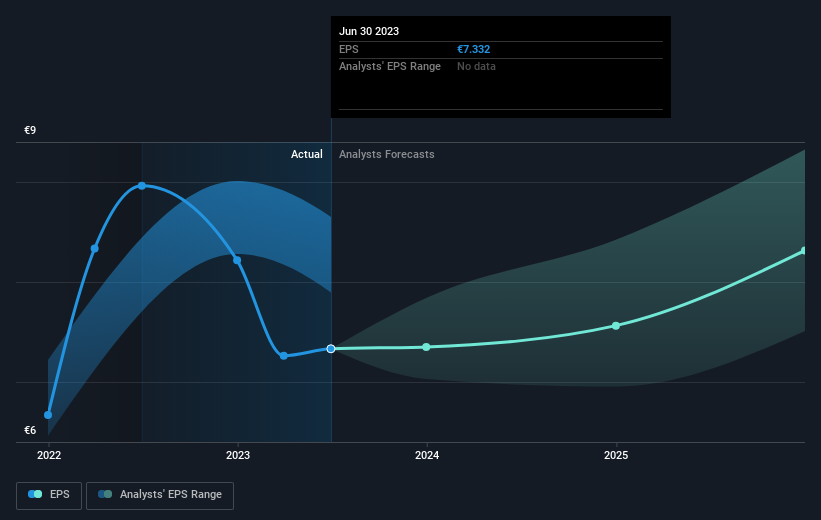Investors who have held Sixt (ETR:SIX2) over the last year have watched its earnings decline along with their investment
Investors can approximate the average market return by buying an index fund. Active investors aim to buy stocks that vastly outperform the market - but in the process, they risk under-performance. Unfortunately the Sixt SE (ETR:SIX2) share price slid 11% over twelve months. That falls noticeably short of the market return of around 7.3%. On the bright side, the stock is actually up 1.9% in the last three years. It's down 19% in about a quarter.
On a more encouraging note the company has added €178m to its market cap in just the last 7 days, so let's see if we can determine what's driven the one-year loss for shareholders.
See our latest analysis for Sixt
In his essay The Superinvestors of Graham-and-Doddsville Warren Buffett described how share prices do not always rationally reflect the value of a business. One flawed but reasonable way to assess how sentiment around a company has changed is to compare the earnings per share (EPS) with the share price.
Unfortunately Sixt reported an EPS drop of 18% for the last year. The share price fall of 11% isn't as bad as the reduction in earnings per share. So the market may not be too worried about the EPS figure, at the moment -- or it may have expected earnings to drop faster.
The image below shows how EPS has tracked over time (if you click on the image you can see greater detail).
We know that Sixt has improved its bottom line over the last three years, but what does the future have in store? This free interactive report on Sixt's balance sheet strength is a great place to start, if you want to investigate the stock further.
What About Dividends?
As well as measuring the share price return, investors should also consider the total shareholder return (TSR). The TSR is a return calculation that accounts for the value of cash dividends (assuming that any dividend received was reinvested) and the calculated value of any discounted capital raisings and spin-offs. Arguably, the TSR gives a more comprehensive picture of the return generated by a stock. As it happens, Sixt's TSR for the last 1 year was -6.6%, which exceeds the share price return mentioned earlier. This is largely a result of its dividend payments!
A Different Perspective
Sixt shareholders are down 6.6% for the year (even including dividends), but the market itself is up 7.3%. However, keep in mind that even the best stocks will sometimes underperform the market over a twelve month period. Longer term investors wouldn't be so upset, since they would have made 1.0%, each year, over five years. It could be that the recent sell-off is an opportunity, so it may be worth checking the fundamental data for signs of a long term growth trend. While it is well worth considering the different impacts that market conditions can have on the share price, there are other factors that are even more important. For instance, we've identified 4 warning signs for Sixt (2 make us uncomfortable) that you should be aware of.
Of course, you might find a fantastic investment by looking elsewhere. So take a peek at this free list of companies we expect will grow earnings.
Please note, the market returns quoted in this article reflect the market weighted average returns of stocks that currently trade on German exchanges.
Have feedback on this article? Concerned about the content? Get in touch with us directly. Alternatively, email editorial-team (at) simplywallst.com.
This article by Simply Wall St is general in nature. We provide commentary based on historical data and analyst forecasts only using an unbiased methodology and our articles are not intended to be financial advice. It does not constitute a recommendation to buy or sell any stock, and does not take account of your objectives, or your financial situation. We aim to bring you long-term focused analysis driven by fundamental data. Note that our analysis may not factor in the latest price-sensitive company announcements or qualitative material. Simply Wall St has no position in any stocks mentioned.

